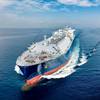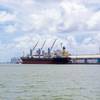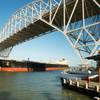The commercial impact of ever-tighter safety, security and vessel standards
comes into focus at the ShipRepair & Conversion 2004 London conference in
November with a programme of debates exploring market trends, product
innovations, shipyard practice and legal issues.
The conference, together with a specialist exhibition, takes place at Grand
Hall, Olympia, on November 24-25 and will be followed by a seminar on
shipyard safety on November 26.
ShipRepair & Conversion 2004 London marks the first appearance in a new
guise of the industry's major event, ShipRepair & Conversion - held annually
in London for the past 12 years but which will now alternate yearly between
its home city and leading overseas repair centres.
As in previous years, the UK exhibition will feature an international
line-up of yards and suppliers including market leaders such as the A&P
Group, Izar, Remontowa, Westfalia Separator, ABB and Kongsberg Maritime.
Meanwhile organiser Lloyd's List Events has revised the conference fee and
format - with a value-for-money delegate rate of £150 for three short
sessions per day - to allow exhibitors and delegates to maximise their
participation in all aspects of the event.
Debates lasting a maximum of 90 minutes will be led by panellists including
Mohammed Al-Khateeb, chief executive of ASRY; Joern Kahle, marine marketing
manager of Hempel; Clive O'Leary, business development manager at
International Coatings; Piete Moreland, technical manager at MME Europe; Bob
Hargreaves, managing director of RCM Marine; and Denis Welch, director of
Intelligent Engineering.
Day 1 starts with a State of the Industry assessment of heightened security
requirements, new regulations on improved shipping standards and the outlook
for 2005. A paints and coatings forum will then examine the effect of
latest legislation on ship owners/managers and the response by
manufacturers. The day ends with a session on conversions, including a
review of prospects over the next five years in the buoyant FPSO/FSU
sectors.
The first session on Day 2 spotlights prevention rather than repair by
discussing how design solutions, monitoring and training can avoid
breakdowns. The next session turns the focus on planning and executing
drydockings, looking at saving time and money through the elimination of
extras.
This leads into a final session on shiprepair contracts, including contact
management, claims avoidance and an examination of the BIMCO standard
drydocking contract - widely adopted as the industry norm since last year -
which panellist Guy Mills, partner at the specialist shipping lawyers Mills
& Co, helped to draft.
"About 90% of all repair contracts go through without dispute," he points
out. "It's only when something goes dramatically wrong that everyone looks
for the contract - and usually it's two pieces of paper with each side
relying on their own terms.
"The BIMCO contract attempts to be neutral and represents an ideal basis for
long-term strategic alliances between owners and repairers because it is
balanced without favouring any one party. The terms can also be readily
amended if the owner goes to another yard.
"In the past, parties have been used to their own terms but now the emphasis
is on using these as a bridge to a neutral contact which at the very least
should avoid minor disputes."
Shipyard safety seminar
A post-event seminar on safety in newbuilding and repair yards is being held
at the Hilton London Olympia on November 26, led by Mario Dogliani, deputy
head of the naval ship department and head of innovation and research at
Italian classification society RINA.
Input at the workshop sessions will come from across the industry. Shipyard
perspectives will be presented by representatives of Euroyards, the working
group formed by leading European yards to co-operate on issues of common
interest.
Owners' requirements will be addressed by members of the Oil Companies
International Marine Forum (OCIMF), which published a safety checklist and
guidelines in 2002. Further aspects will be examined by personnel from a
major P&I Club and the Salvage Association, with Mr Dogliani adding a
classification society viewpoint.
As he emphasises: "The importance of this seminar is not so much that safety
standards are getting worse but that the impact when things go wrong is much
greater, because European yards are mainly involved with extremely costly
ships.
"The damage is very high in cost terms, if not loss of life, so although we
are talking about only two or three major incidents a year, they are
attracting increasing attention from yards, operators and insurers because
of the high value involved."
Subscribe for
Maritime Reporter E-News
Maritime Reporter E-News is the maritime industry's largest circulation and most authoritative ENews Service, delivered to your Email five times per week










